- Home
- Robert Ervin Howard
Jewels of Gwahlur (conan the warrior) Page 2
Jewels of Gwahlur (conan the warrior) Read online
Page 2
But there was always another possibility: if Thutmekri could get his hands on the hoard, it would be characteristic of the man to cheat his employers, steal the jewels for himself and decamp, leaving the Zembabwan emissaries holding the sack.
Conan believed that this consulting of the oracle was but a ruse to persuade the king of Keshan to accede to Thutmekri's wishes — for he never for a moment doubted that Gorulga was as subtle and devious as all the rest mixed up in this grand swindle. Conan had not approached the high priest himself, because in the game of bribery he would have no chance against Thutmekri, and to attempt it would be to play directly into the Stygian's hands. Gorulga could denounce the Cimmerian to the people, establish a reputation for integrity, and rid Thutmekri of his rival at one stroke. He wondered how Thutmekri had corrupted the high priest, and just what could be offered as a bribe to a man who had the greatest treasure in the world under his fingers.
At any rate he was sure that the oracle would be made to say that the gods willed it that Keshan whould follow Thutmekri's wishes, and he was sure, too, that it would drop a few pointed remarks concerning himself. After that Keshia would be too hot for the Cimmerian, nor had Conan had any intention of returning when he rode way in the night.
The oracle chamber held no clue for him. He went forth into the great throne room and laid his hands on the throne. It was heavy, but he could tilt it up. The floor beneath, a thick marble dais, was solid. Again he sought the alcove. His mind clung to a secret crypt near the oracle. Painstakingly he began to tap along the walls, and presently his taps rang hollow at a spot opposite the mouth of the narrow corridor. Looking more closely he saw that the crack between the marble panel at that point and the next was wider than usual. He inserted a dagger point and pried.
Silently the panel swung open, revealing a niche in the wall, but nothing else. He swore feelingly. The aperture was empty, and it did not look as if it had ever served as a crypt for treasure. Leaning into the niche he saw a system of tiny holes in the wall, about on a level with a man's mouth. He peered through, and grunted understandingly. That was the wall that formed the partition between the alcove and the oracle chamber. Those holes had not been visible in the chamber. Conan grinned. This explained the mystery of the oracle, but it was a bit cruder than he had expected. Gorulga would plant either himself or some trusted minion in that niche, to talk through the holes, the credulous acolytes, black men all, would accept it as the veritable voice of Yelaya.
Remembering something, the Cimmerian drew forth the roll of parchment he had taken from the mummy and unrolled it carefully, as it seemed ready to fall to pieces with age. He scowled over the dim characters with which it was covered. In his roaming about the world the giant adventurer had picked up a wide smattering of knowledge, particularly including the speaking and reading of many alien tongues. Many a sheltered scholar would have been astonished at the Cimmerian's linguistic abilities, for he had experienced many adventures where knowledge of a strange language had meant the difference between life and death.
The characters were puzzling, at once familiar and unintelligible, and presently he discovered the reason. They were the characters of archaic Pelishtic, which possessed many points of difference from the modern script, with which he was familiar, and which, three centuries ago, had been modified by conquest by a nomad tribe. This older, purer script baffled him. He made out a recurrent phrase, however, which he recognized as a proper name: Bit-Yakin. He gathered that it was the name of the writer.
Scowling, his lips unconsciously moving as he struggled with the task, he blundered through the manuscript, finding much of it untranslatable and most of the rest of it obscure.
He gathered that the writer, the mysterious Bit-Yakin, had come from afar with his servants, and entered the valley of Alkmeenon. Much that followed was meaningless, interspersed as it was with unfamiliar phrases and characters. Such as he could translate seemed to indicate the passing of a very long period of time. The name of Yelaya was repeated frequently, and toward the last part of the manuscript it became apparent that Bit-Yakin knew that death was upon him. With a slight start Conan realized that the mummy in the cavern must be the remains of the writer of the manuscript, the mysterious Pelishti, Bit-Yakin. The man had died, as he had prophesied, and his servants, obviously, had placed him in that open crypt, high up on the cliffs, according to his instructions before his death.
It was strange that Bit-Yakin was not mentioned in any of the legends of Alkmeenon. Obviously he had come to the valley after it had been deserted by the original inhabitants — the manuscript indicated as much — but it seemed peculiar that the priests who came in the old days to consult the oracle had not seen the man or his servants. Conan felt sure that the mummy and this parchment was more than a hundred years old. Bit-Yakin had dwelt in the valley when the priests came of old to bow before dead Yelaya. Yet concerning him the legends were silent, telling only of a deserted city, haunted only by the dead.
Why had the man dwelt in this desolate spot, and to what unknown destination had his servants departed after disposing of their master's corpse?
Conan shrugged his shoulders and thrust the parchment back into his girdle — he started violently, the skin on the backs of his hands tingling. Startingly, shockingly in the slumberous stillness, there had boomed the deep strident clangor of a great gong!
He wheeled, crouching like a great cat, sword in hand, glaring down the narrow corridor from which the sound had seemed to come. Had the priests of Keshia arrived? This was improbable, he knew; they would not have had time to reach the valley. But that gong was indisputable evidence of human presence.
Conan was basically a direct-actionist. Such subtlety as he possessed had been acquired through contact with the more devious races. When taken off guard by some unexpected occurrence, he reverted instinctively to type. So now, instead of hiding or slipping away in the opposite direction as the average man might have done, he ran straight down the corridor in the direction of the sound. His sandals made no more sound than the pads of a panther would have made; his eyes were slits, his lips unconsciously asnarl. Panic had momentarily touched his soul at the shock of that unexpected reverberation, and the red rage of the primitive that is wakened by threat of peril, always lurked close to the surface of the Cimmerian.
He emerged presently from the winding corridor into a small open court. Something glinting in the sun caught his eye. It was the gong, a great gold disk, hanging from a gold arm extending from the crumbling wall. A brass mallet lay near, but there was no sound or sight of humanity. The surrounding arches gaped emptily. Conan crouched inside the doorway for what seemed a long time. There was no sound or movement throughout the great palace. His patience exhausted at last, he glided around the curve of the court, peering into the arches, ready to leap either way like a flash of light, or to strike right or left as a cobra strikes.
He reached the gong, started into the arch nearest it. He saw only a dim chamber, littered with the debris of decay. Beneath the gong the polished marble flags showed no footprint, but there was a scent in the air — a faintly fetid odor he could not classify; his nostrils dilated like those of a wild beast as he sought in vain to identify it.
He turned toward the arch — with appalling suddenness the seemingly solid flags splintered and gave way under his feet. Even as he fell he spread wide his arms and caught the edges of the aperture that gaped beneath him. The edges crumbled off under his clutching fingers. Down into utter blackness he shot, into black icy water that gripped him and whirled him away with breathless speed.
2. A Goddess Awakens
The Cimmerian at first made no attempt to fight the current that was sweeping him through lightless night. He kept himself afloat, gripping between his teeth the sword, which he had not relinquished, even in his fall, and did not seek to guess to what doom he was being borne. But suddenly a beam of light lanced the darkness ahead of him. He saw the surging, seething black surface of the water, in tu
rmoil as if disturbed by some monster of the deep, and he saw the sheer stone walls of the channel curved up to a vault overhead. On each side ran a narrow ledge, just below the arching roof, but they were far out of his reach. At one point this roof had been broken, probably fallen in, and the light was streaming through the aperture. Beyond that shaft of light was utter blackness, and panic assailed the Cimmerian as he saw he would be swept on past that spot of light, and into the unknown blackness again.
Then he saw something else: bronze ladders extending from the ledges to the water's surface at regular intervals, and there was one just ahead of him. Instantly he struck out for it, fighting the current that would have held him to the middle of the stream. It dragged at him as with tangible, animate, slimy hands, but he buffeted the rushing surge with the strength of desperation and drew closer and closer inshore, fighting furiously for every inch. Now he was even with the laddeer and with a fierce, gasping plunge he gripped the bottom rung and hung on, breathless.
A few seconds later he struggled up out of the seething water, trusting his weight dubiously to the corroded rungs. They sagged and bent, but they held, and he clambered up onto the narrow ledge which ran along the wall scarcely a man's length below the curving roof. The tall Cimmerian was forced to bend his head as he stood up. A heavy bronze door showed in the stone at a point even with the head of the ladder, but it did not give to Conan's efforts. He transferred his sword from his teeth to its scabbard, spitting blood — for the edge had cut his lips in that fierce fight with the river — and turned his attention to the broken roof.
He could reach his arms up through the crevice and grip the edge, and careful testing told him it would bear his weight. An instant later he had drawn himself up through the hole, and found himself in a wide chamber, in a state of extreme disrepair. Most of the roof had fallen in, as well as a great section of the floor, which was laid over the vault of a subterranean river. Broken arches opened into other chambers and corridors, and Conan believed he was still in the great palace. He wondered uneasily how many chambers in that palace had underground water directly under them, and when the ancient flags or tiles might give way again and precipitate him back into the current from which he had just crawled.
And he wondered just how much of an accident that fall had been. Had those rotten flags simply chanced to give way beneath his weight, or was there a more sinister explanation? One thing at least was obvious: he was not the only living thing in that palace. That gong had not sounded of its own accord, whether the noise had been meant to lure him to his death, or not. The silence of the palace became suddenly sinister, fraught with crawling menace.
Could it be someone on the same mission as himself? A sudden thought occurred to him, at the memory of the mysterious Bit-Yakin. Was it not possible that this man had found the Teeth of Gwahlur in his long residence in Alkmeenon — that his servants had taken them with them when they departed? The possibility that he might be following a will-o'-the-wisp infuriated the Cimmerian.
Choosing a corridor which he believed led back toward the part of the palace he had first entered, he hurried along it, stepping gingerly as he thought of that black river that seethed and foamed somewhere below his feet.
His speculations recurrently revolved about the oracle chamber and its cryptic occupant. Somewhere in that vicinity must be the clue to the mystery of the treasure, if indeed it still remained in its immemorial hiding place.
The great palace lay silent as ever, disturbed only by the swift passing of his sandaled feet. The chambers and halls he traversed were crumbling into ruin, but as he advanced the ravages of decay became less apparent. He wondered briefly for what purpose the ladders had been suspended from the ledges over the subterranean river, but dismissed the matter with a shrug. He was little interested in speculating over unremunerative problems of antiquity.
He was not sure just where the oracle chamber lay, from where he was, but presently he emerged into a corridor which led back into the great throne room under one of the arches. He had reached a decision; it was useless for him to wander aimlessly about the palace, seeking the hoard. He would conceal himself somewhere here, wait until the Keshani priests came, and then, after they had gone through the farce of consulting the oracle, he would follow them to the hiding place of the gems, to which he was certain they would go. Perhaps they would take only a few of the jewels with them. He would content himself with the rest.
Drawn by a morbid fascination, he re-entered the oracle chamber and stared down again at the motionless figure of the princess who was worshipped as a goddess, entranced by her frigid beauty. What cryptic secret was locked in that marvelously molded form?
He started violently. The breath sucked through his teeth, the short hairs prickled at the back of his scalp. The body still lay as he had first seen it, silent, motionless, in breast-plates of jeweled gold, gilded sandals and silken skirt. But now there was a subtle difference. The lissom limbs were not rigid, a peach-bloom touched the cheeks, the lips were red —
With a panicky curse Conan ripped out his sword.
"Crom! She's alive! "
At his words the long dark lashes lifted; the eyes opened and gazed up at him inscrutably, dark, lustrous, mystical. He glared in frozen speechlessness.
She sat up with a supple ease, still holding his ensorcelled stare.
He licked his dry lips and found voice.
"You — are — are you Yelaya?" he stammered.
"I am Yelaya!" The voice was rich and musical, and he stared with new wonder. "Do not fear. I will not harm you if you do my bidding."
"How can a dead woman come to life after all these centuries?" he demanded, as if skeptical of what his senses told him. A curious gleam was beginning to smolder in his eyes.
She lifted her arms in a mystical gesture.
"I am a goddess. A thousand years ago there descended upon me the curse of the greater gods, the gods of darkness beyond the borders of light. The mortal in me died; the goddess in me could never die. Here I have lain for so many centuries, to awaken each night at sunset and hold my court as of yore, with specters drawn from the shadows of the past. Man, if you would not view that which will blast your soul for ever, ge hence quickly! I command you! Go!" The voice became imperious, and her slender arm lifted and pointed.
Conan, his eyes burning slits, slowly sheathed his sword, but he did not obey her order. He stepped closer, as if impelled by a powerful fascination — without the slightest warning he grabbed her up in a bear-like grasp. She screamed a very ungoddess-like scream, and there was a sound of ripping silk, as with one ruthless wrench he tore off her skirt.
"Goddess! Ha!" His bark was full of angry contempt. He ignored the frantic writhings of his captive. "I thought it was strange that a princess of Alkmeenon would speak with a Corinthian accent! As soon as I'd gathered my wits I knew I'd seen you somewhere. You're Muriela, Zargheba's Corinthian dancing girl. This crescent-shaped birthmark on your hip proves it. I saw it once when Zargheba was whipping you. Goddess! Bah!" He smacked the betraying hip contemptuously and resoundingly with his open hand, and the girl yelped piteously.
All her imperiousness had gone out of her. She was no longer a mystical figure of antiquity, but a terrified and humiliated dancing girl, such as can be bought at almost any Shemitish market place. She lifted up her voice and wept unashamedly. Her captor glared down at her with angry triumph.
"Goddess! Ha! So you were one of the veiled women Zargheba brought to Keshia with him. Did you think you could fool me, you little idiot? A year ago I saw you in Akbitana with that swine, Zargheba, and I don't forget faces — or women's figures. I think I'll — "
Squirming about in his grasp she threw her slender arms about his massive neck in an abandon of terror; tears coursed down her cheeks, and her sobs quivered with a note of hysteria.
"Oh, please don't hurt me! Don't! I had to do it! Zargheba brought me here to act as the oracle!"
"Why, you sacrilegious little hussy!
" rumbled Conan. "Do you not fear the gods? Crom! Is there no honesty anywhere?"
"Oh, please!" she begged, quivering with abject fright. "I couldn't disobey Zargheba. Oh, what shall I do? I shall be cursed by these heathen gods!"
"What do you think the priests will do to you if they find out you're an imposter?" he demanded.
At the thought her legs refused to support her, and she collapsed in a shuddering heap, clasping Conan's knees and mingling incoherent pleas for mercy and protection with piteous protestations of her innocence of any malign intention. It was a vivid change from her pose as the ancient princess, but not surprising. The fear that had nerved her then was now her undoing.
"Where is Zargheba?" he demanded. "Stop yammering, damn it, and answer me."
"Outside the palace," she whimpered, "watching for the priests."
"How many men with him?"
"None. We came alone."
"Ha!" It was much like the satisfied grunt of a hunting lion. "You must have left Keshia a few hours after I did. Did you climb the cliffs?"
She shook her head, too choked with tears to speak coherently. With an impatient imprecation he seized her slim shoulders and shook her until she gasped for breath.
"Will you quit that blubbering and answer me? How did you get into the valley?"
"Zargheba knew the secret way," she gasped. "The priest Gwarunga told him, and Thutmekri. On the south side of the valley there is a broad pool lying at the foot of the cliffs. There is a cave-mouth under the surface of the water that is not visible to the casual glance. We ducked under the water and entered it. The cave slopes up out of the water swiftly and leads through the cliffs. The opening on the side of the valley is masked by heavy thickets."
"I climbed the cliffs on the east side," he muttered. "Well, what then?"
"We came to the palace and Zargheba hid me among the trees while he went to look for the chamber of the oracle. I do not think he fully trusted Gwarunga. While he was gone I thought I heard a gong sound, but I was not sure. Presently Zargheba came and took me into the palace and brought me to this chamber, where the goddess Yelaya lay upon the dais. He stripped the body and clothed me in the garments and ornaments. Then he went forth to hide the body and watch for the priests. I have been afraid. When you entered I wanted to leap up and beg you to take me away from this place, but I feared Zargheba. When you discovered I was alive, I thought I could frighten you away."

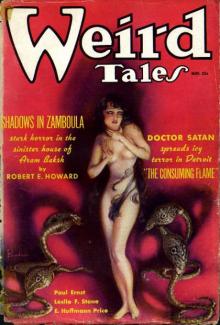 Shadows in Zamboula (conan the barbarian)
Shadows in Zamboula (conan the barbarian)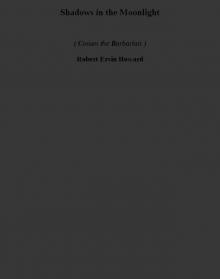 Shadows in the Moonlight (conan the barbarian)
Shadows in the Moonlight (conan the barbarian)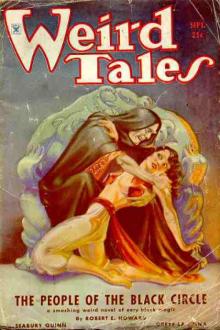 The People of the Black Circle (conan the barbarian)
The People of the Black Circle (conan the barbarian) Almuric
Almuric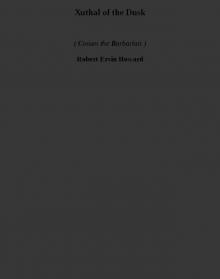 Xuthal of the Dusk (conan the barbarian)
Xuthal of the Dusk (conan the barbarian)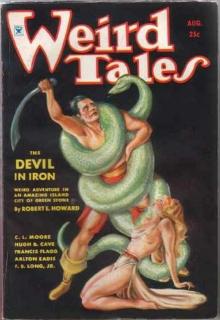 The Devil in Iron (conan the barbarian)
The Devil in Iron (conan the barbarian) Beyond the Black River (conan the warrior)
Beyond the Black River (conan the warrior)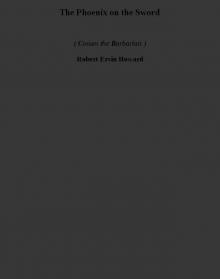 The Phoenix on the Sword (conan the barbarian)
The Phoenix on the Sword (conan the barbarian)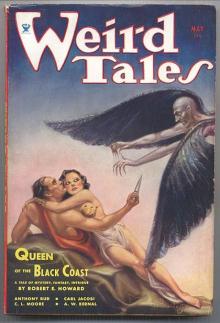 Queen of the Black Coast
Queen of the Black Coast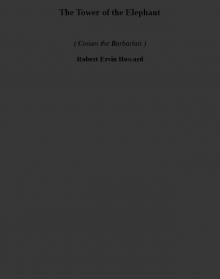 The Tower of the Elephant (conan the barbarian)
The Tower of the Elephant (conan the barbarian) Black Colossus
Black Colossus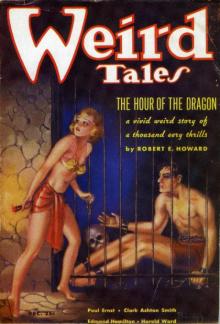 The Hour of the Dragon (conan the barbarian)
The Hour of the Dragon (conan the barbarian)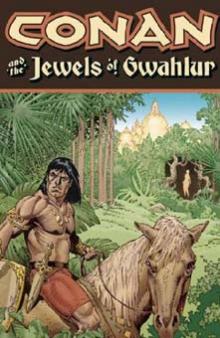 Jewels of Gwahlur (conan the warrior)
Jewels of Gwahlur (conan the warrior)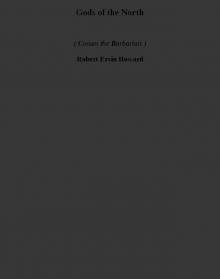 Gods of the North (conan the barbarian)
Gods of the North (conan the barbarian) The Pool of the Black One (conan the barbarian)
The Pool of the Black One (conan the barbarian) A Witch Shall Be Born
A Witch Shall Be Born Red Nails (conan the warrior)
Red Nails (conan the warrior)